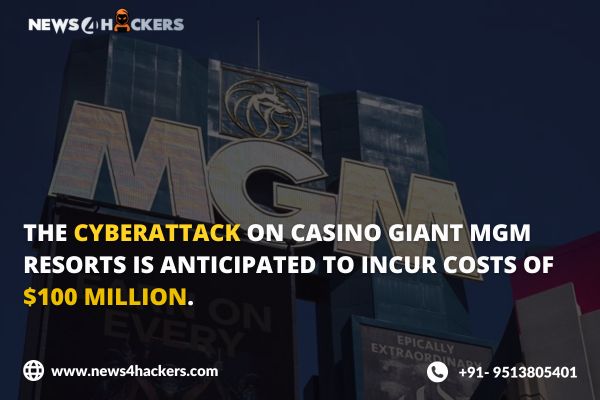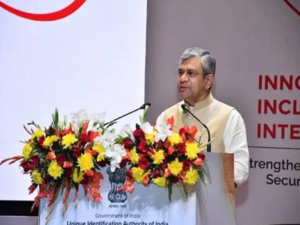The Cyberattack on Casino Giant MGM Resorts is Anticipated to Incur Costs of $100 Million.

The Cyberattack on Casino Giant MGM Resorts is Anticipated to Incur Costs of $100 Million.
The data breach that MGM Resorts describes as a digital attack will probably cost the casino giant over USD $100 million.

New York: MGM Resorts, a Las Vegas-based casino empire, has reported a data breach incident that occurred last month, which the company has classified as a cyberattack. As a consequence, MGM Resorts anticipates incurring financial losses exceeding $100 million.
The occurrence, identified on September 10th, prompted MGM to implement the closure of some computer systems at casinos and hotels across the United States as a precautionary measure to safeguard data.
According to MGM, the impact on reservations and casino operations in Las Vegas and other states was observed as patrons utilized social media platforms to recount their experiences of encountering difficulties with credit card transactions, accessing cash from automated teller machines, and gaining entry into hotel accommodations. On September 20, the corporation made an official announcement regarding the conclusion of its ten-day computer downtime.

The occurrence exhibited characteristic features of a ransomware assault involving extortion, but MGM has not officially acknowledged this. According to Brett Callow, an expert from the cybersecurity firm Emsisoft, if this is indeed the case, it might potentially be deemed as the most expensive ransomware attack documented thus far. In the year 2019, Norsk Hydro, a prominent aluminum producer based in Norway, incurred financial damages of up to $70 million as a consequence of their decision to withhold payment from ransomware perpetrators.
According to a message addressed to customers by MGM CEO Bill Hornbuckle, there were disruptions encountered at certain properties; however, operations at the affected properties have since returned to their regular state, and the restoration of the majority of our systems has been successfully accomplished. Additionally, it is our contention that this assault has been effectively confined.
According to Hornbuckle, there was no compromise of consumer bank account details or payment card information in the event. According to the statement, in addition to the aforementioned incident, unauthorized individuals gained access to more personal data such as names, contact details, driver’s license numbers, Social Security numbers, and passport numbers of some customers who engaged in transactions with MGM prior to March 2019.
According to Hornbuckel, MGM does not possess any substantiating information indicating that the hackers and criminals have utilized the acquired data for the purpose of engaging in account fraud or identity theft. Additionally, the business intends to communicate with affected users by email and extend complimentary services for safeguarding their identities and monitoring their credit activities.
“We express our regret regarding this outcome and extend our sincere apologies to those individuals who have been affected,” he further stated.

According to a submission made to the Securities and Exchange Commission, MGM has expressed its belief that the data breach that occurred in September will adversely affect its financial performance in the third quarter, particularly in the Las Vegas region. However, it anticipates only a small impact on its financial results in the fourth quarter and overall operational performance for the year.
In conjunction with the approximate $100 million decline in adjusted property earnings before interest, taxes, depreciation, amortization, and rent for its Las Vegas Strip resorts and other regional operations, MGM anticipates incurring expenses amounting to less than $10 million encompassing singular costs such as legal fees and technology consulting.
Last month, MGM was not the sole casino conglomerate to experience a cyberattack. Caesars Entertainment made a public announcement on a cyberattack that occurred on September 7th. The corporation headquartered in Reno reported that its casino and online activities remained unaffected.
According to widespread reports, Caesars allegedly disbursed a sum of $15 million out of a total ransom demand of $30 million, which was made by a group known as Scattered Spider, with the intention of ensuring the safeguarding of the data. Based on a story published in the Wall Street Journal on Thursday, it has been said by an undisclosed source with knowledge of the situation that MGM declined to comply with the ransom demand made by hackers in September.
The spokesperson representing MGM declined to provide confirmation or denial about the report.
According to a recent report by the Las Vegas Review-Journal, the two casino operators are currently confronted with a total of nine federal lawsuits related to the hacks.
In addition to the realm of casinos, Clorox recently made public the occurrence of a cyberattack, wherein it revealed the detection of “unauthorized activity” on some components of its information technology infrastructure in the month of August. The manufacturer of bleach and various other home products has reported that the attack has resulted in significant disruptions to its operations, leading to substantial shortages of supplies and delays in order processing.
In a release made on Wednesday, Clorox said that it anticipates a decline in its net sales ranging from 23% to 28% for the first quarter of 2024.
About The Author:
Yogesh Naager is a content marketer who specializes in the cybersecurity and B2B space. Besides writing for the News4Hackers blog, he’s also written for brands including CollegeDunia, Utsav Fashion, and NASSCOM. Naager entered the field of content in an unusual way. He began his career as an insurance sales executive, where he developed an interest in simplifying difficult concepts. He also combines this interest with a love of narrative, which makes him a good writer in the cybersecurity field. In the bottom line, he frequently writes for Craw Security.
Read More News Here






